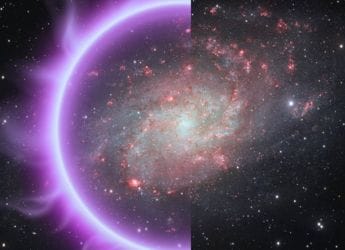- Home
- Science
- Science News
- Pluto's Orbit Is Highly Chaotic, Radically Different From Other Planets: Study
Pluto's Orbit Is Highly Chaotic, Radically Different From Other Planets: Study
Pluto's orbit is radically different from that of other planets, scientists claim.

Photo Credit: NASA/ Johns Hopkins University Applied Physics Laboratory/ Southwest Research Institute/ Alex Parker
Most accurate natural colour images of Pluto taken by NASA's New Horizons
Since Pluto - the dwarf planet - was discovered in 1930, it has generated considerable interest among astronomers, primarily over its highly eccentric and inclined orbit. New research claims that it is also subject to chaotic perturbance and changes over shorter timescales. At larger timescales, the orbit appears relatively stable. What it really means is that Pluto's orbit is radically different from that of other planets. Most planets follow nearly circular orbits around the Sun close to its equator. However, Pluto follows a highly elliptical orbit.
Pluto's orbit is inclined 17 degrees to the solar system's ecliptic plane. Pluto takes 248 years to complete a single orbit around the Sun. It also means Pluto spends 20 years during each cycle orbiting closer to the Sun than Neptune.
While these two planets cross paths, what keeps them from colliding with each other? Researchers say an orbital resonance condition known as a “mean motion resonance” keeps them from hitting each other. Pluto's orbit has a stable 3:2 mean motion resonance with Neptune. For every two orbits that Pluto makes around the sun, Neptune makes three, preventing a collision between them.
The research has been carried out by Dr. Renu Malhotra, from the University of Arizona, and Takashi Ito, from the Chiba Institute of Technology. It has been published in the Proceedings of the National Academy of Sciences.
“We demonstrate that the orbital architecture of the giant planets lies within a narrow niche in which Pluto-like orbits are practically stable on gigayear timescales, whereas nearby are strongly chaotic orbits,” the researchers write in the paper.
They also say that their investigations have found that Jupiter has a largely stabilising influence whereas Uranus has a largely destabilising influence on Pluto's orbit. Overall, Pluto's orbit is rather surprisingly close to a zone of strong chaos, they add.
Pluto was discovered in 1930 by astronomer Clyde Tombaugh. It was visited for the first time on July 14, 2015, by the New Horizons mission by NASA.
Get your daily dose of tech news, reviews, and insights, in under 80 characters on Gadgets 360 Turbo. Connect with fellow tech lovers on our Forum. Follow us on X, Facebook, WhatsApp, Threads and Google News for instant updates. Catch all the action on our YouTube channel.
Related Stories
- Samsung Galaxy Unpacked 2025
- ChatGPT
- Redmi Note 14 Pro+
- iPhone 16
- Apple Vision Pro
- Oneplus 12
- OnePlus Nord CE 3 Lite 5G
- iPhone 13
- Xiaomi 14 Pro
- Oppo Find N3
- Tecno Spark Go (2023)
- Realme V30
- Best Phones Under 25000
- Samsung Galaxy S24 Series
- Cryptocurrency
- iQoo 12
- Samsung Galaxy S24 Ultra
- Giottus
- Samsung Galaxy Z Flip 5
- Apple 'Scary Fast'
- Housefull 5
- GoPro Hero 12 Black Review
- Invincible Season 2
- JioGlass
- HD Ready TV
- Laptop Under 50000
- Smartwatch Under 10000
- Latest Mobile Phones
- Compare Phones
- iQOO 15 Ultra
- OPPO A6v 5G
- OPPO A6i+ 5G
- Realme 16 5G
- Redmi Turbo 5
- Redmi Turbo 5 Max
- Moto G77
- Moto G67
- Asus Vivobook 16
- Asus Vivobook S16 (2026)
- Black Shark Gaming Tablet
- Lenovo Idea Tab Plus
- HMD Watch P1
- HMD Watch X1
- Haier H5E Series
- Acerpure Nitro Z Series 100-inch QLED TV
- Asus ROG Ally
- Nintendo Switch Lite
- Haier 1.6 Ton 5 Star Inverter Split AC (HSU19G-MZAID5BN-INV)
- Haier 1.6 Ton 5 Star Inverter Split AC (HSU19G-MZAIM5BN-INV)

















